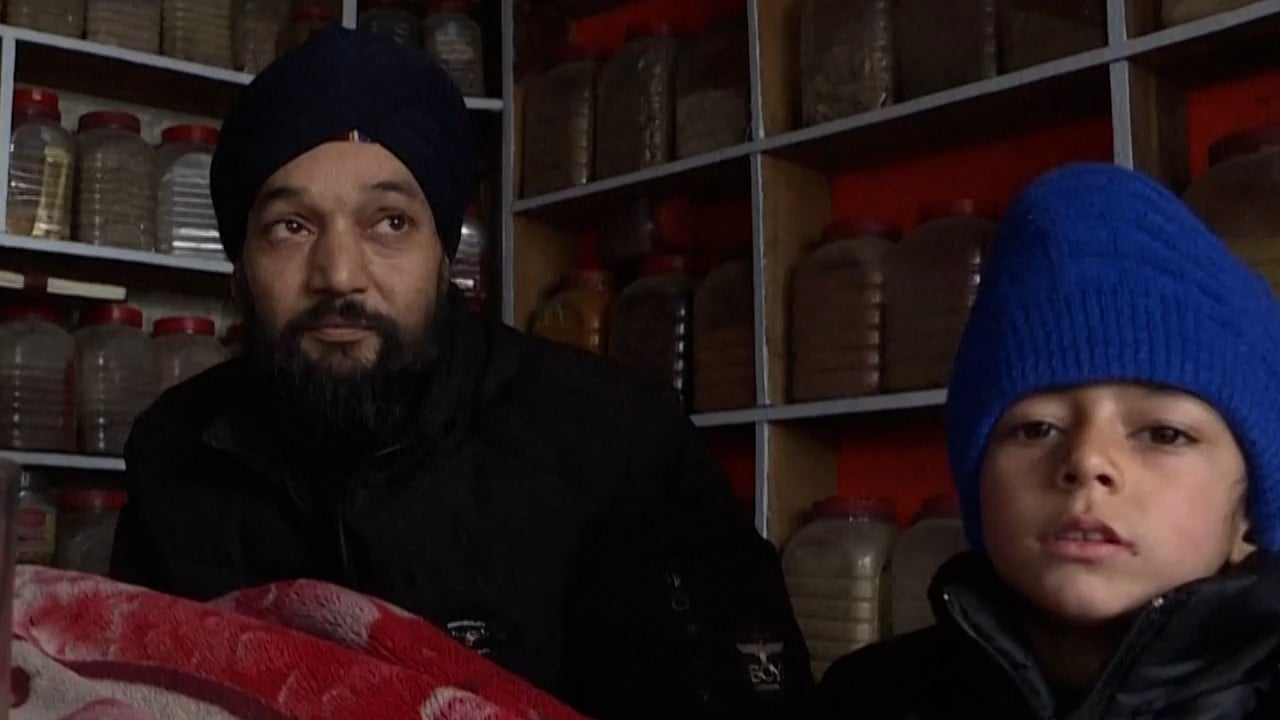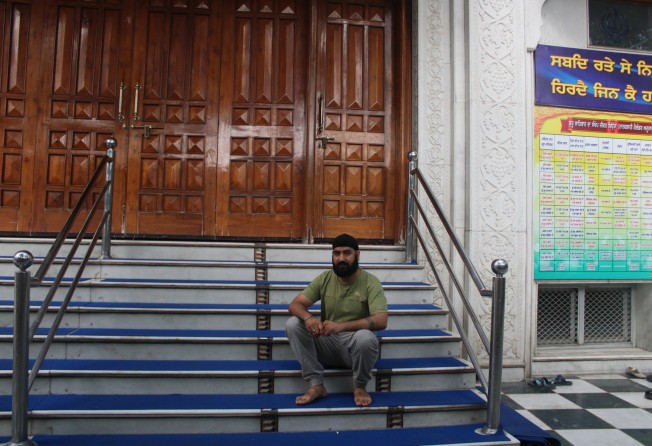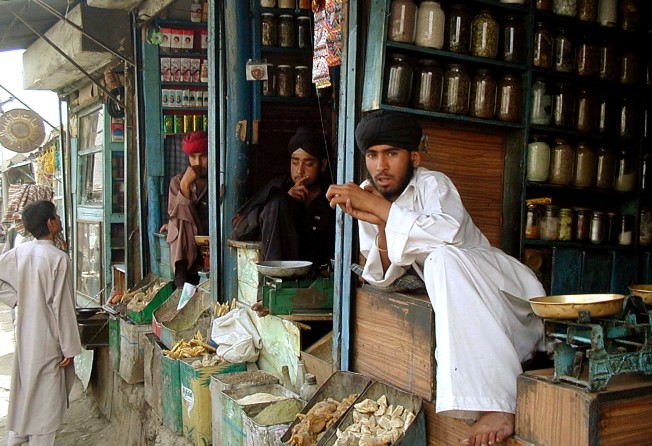
03:20
Afghanistan’s last Sikhs ponder leaving their centuries-old home to go into exile

Manmohan Singh mostly spends his day in a Gurdwara, a place of worship for Sikhs, in India’s capital New Delhi.
The 45-year-old refugee from Afghanistan fled Kabul last month with his wife and five children, weeks after a fatal blast and gunfire went off at a Gurdwara next to their home.
Uncertain about his future and unemployed, Manmohan’s mind is invariably occupied with what to do and how to settle down in an alien land.
“I can’t see anything except darkness around, but one thing that keeps me going is the hope that things will turn better in the days to come,” he said. “But if you ask me how, I have no answer.”
In Kabul, Manmohan worked in a traditional Islamic medicine (Unani) shop and earned US$140 a month. But since coming to India he has had no income.
“It has been more than a month since we arrived but I can’t find work anywhere. Who will give me work, as I don’t have any educational degree?” he said, adding that he is unable to speak Hindi or English. He speaks Punjabi, Persian and Pashto.
Manmohan and his family are being looked after by the local Gurdwara committee in Tilak Nagar, an area in the west of New Delhi. Both accommodation and food have been provided.
The Gurdwara is managed and run by the Afghan Sikh community, who first began arriving in India in the 1990s. Sikhism, which began in the 15th century in the Punjab – currently divided between India and Pakistan – has also been in Afghanistan for hundreds of years since Guru Nanak, the founder of Sikhism, visited Kabul.
Many Afghans have moved abroad in recent decades, with around 11,000 registered as asylum-seekers in India, most of them near the capital, according to the UNHCR.
The influx from Afghanistan began in 1979, when the 10-year Soviet-Afghan war began. Last year the US withdrew its forces and the Taliban took control of the country.
Back in the day it was minorities in Afghanistan – Hindus and Sikhs – who travelled to India to find refuge but as conflict worsened back home, including from 2001 after the September 11 attacks in the US, more ethnic Afghans found shelter in their neighbouring nation too.
Manmohan does not like to remember what happened on June 18 this year but he cannot help the events of that day flashing through his mind. He was at home when the nearby Gurdwara was attacked by ISIS terrorists. With his family he managed to flee but the attack left two people dead – one Sikh and a Muslim security guard – and seven injured.
“When we heard gunshots, we got scared and ran for safety. When we returned to the site, the scenes were horrific. There was blood lying on the floor of Gurdwara. My children were crying and the fear was palpable.”
The attack left the Singh family traumatised. They soon decided to emigrate.
The Gurdwara has also become a new home for other Afghan Sikhs who find themselves struggling in India’s capital.
Gurdwara boss Pratap Singh, an Afghan refugee who arrived in New Delhi 30 years ago, said that at least 75 Afghan Sikhs and one Hindu have come to the city since the Taliban came to power last year.
Some have managed to find jobs, but many are struggling.

Mahinder Singh, 31, and his elder brother Ranjit, 34, from the city of Jalalabad in eastern Afghanistan, left behind their two cosmetic and herbal shops when they escaped to India, also ending up in the Gurdwara in the Tilak Nagar area of New Delhi.
“We were doing well financially but the situation forced us to leave our country,” said Mahinder, who is unmarried. “It was an unfortunate moment for all of us to leave everything behind – our home, our businesses, religious places, and our neighbours.”
In 2018 a blast rocked Jalalabad, leaving at least 14 people dead and several injured, including Mahinder. Although he only suffered minor injuries it was a signal his home was not safe.
He stayed on, though, until the June attack this year in the Kabul Gurdwara. It was at that point that his family sought help from the Afghan Sikh community in India, who assisted with visas and tickets; they left Afghanistan on August 3.
The exit from his home country was painful. Amid sobs, Mahinder boarded a flight to New Delhi from Kabul.
“I don’t know if we can ever return,” he said, but he hopes “life provides us better opportunities here so we don’t miss our home”.
The family of six, which includes his mother and his brother’s wife and two children, are currently living in the same Gurdwara. None of them are working yet.
Since the Taliban seized control in August last year, religious freedoms in Afghanistan have deteriorated.
During the 1980s the number of Sikhs and Hindus in the country was estimated to be over 200,000. A 2016 investigation by TV news channel Tolonews revealed that number had dropped to just 1350, which has dwindled further since then, amid more attacks.
Before the Taliban took charge, there were reportedly 300 Sikhs. However, there are now thought to be around 70 Sikhs and about 30 Hindus in Afghanistan, according to Sikh community members in New Delhi.

Meenakshi Ganguly, South Asia director at Human Rights Watch, said “ugly majoritarianism” was rising in many parts of the world, “often fanned by bigoted political ideologies that incite hate against ethnic or religious minorities, leave them vulnerable to attack”.
Although life is, and will be, different for both the newly-arrived Singh families in New Delhi, they have found a safe home and their children can go to school. They could not do so in Kabul as they were “bullied”, said Mahinder.
“We do not want that to happen with our next generations,” he added. “I want to see our children go to school.”
Pratap, the head of the Gurdwara in New Delhi, fears that the growing attacks on minorities in Afghanistan will force the few remaining Sikhs still living there to move to India.
Media reports said that at least 61 e-visa applications for Afghan minorities are pending with the Indian government.
“As soon as they get their visas, they will also come here,” said Pratap.
His community has asked the Indian government to provide Afghan Sikh refugees with jobs, homes and free education for their children.
“For Sikhs and Hindus, India is the real home,” he added. “Our forefathers were Indian because Afghanistan was once a part of India. We are not strangers here.”